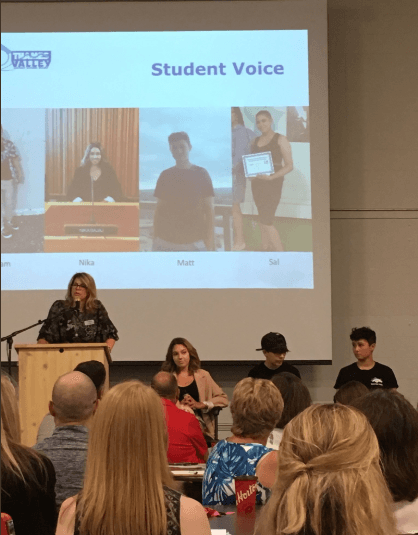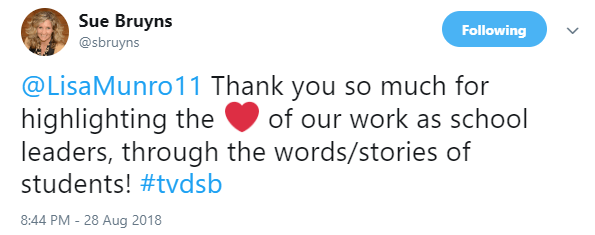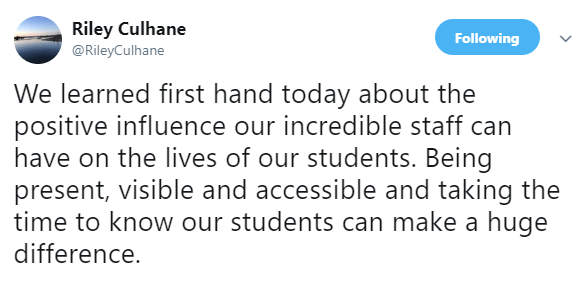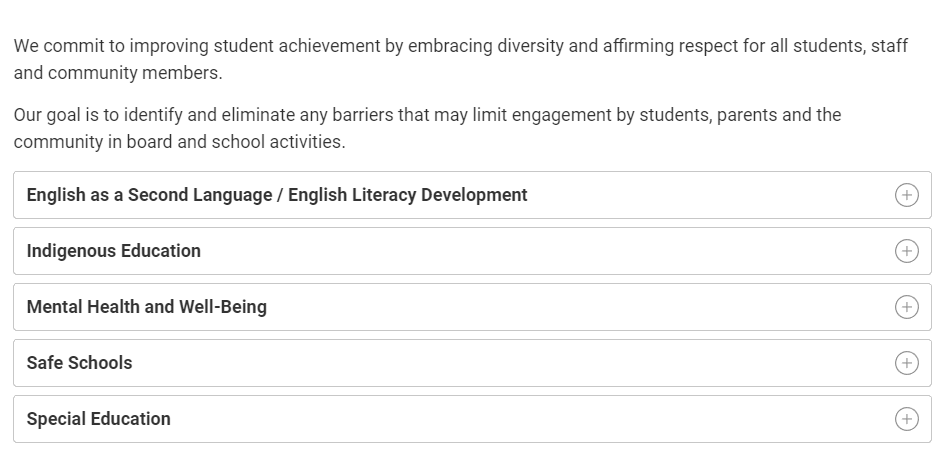 I recently had the opportunity to listen to a student panel of four remarkable students. They shared some of their personal stories in the context of the complex and exciting work of equity. Each student described their path/struggles at school and a staff member who made a positive impact in their life. Their stories helped to frame the WHY behind our need to create safe and equitable spaces in our schools and reminded us of WHO is in front of the daily decisions we make as school and system administrators. The students’ honest and optimistic messages highlighted that the actions of educators, both large and small, have impact. In fact, the impact they had in the room that morning was almost palpable. I personally left the meeting feeling incredibly optimistic about work of equity and inclusion in my role.
I recently had the opportunity to listen to a student panel of four remarkable students. They shared some of their personal stories in the context of the complex and exciting work of equity. Each student described their path/struggles at school and a staff member who made a positive impact in their life. Their stories helped to frame the WHY behind our need to create safe and equitable spaces in our schools and reminded us of WHO is in front of the daily decisions we make as school and system administrators. The students’ honest and optimistic messages highlighted that the actions of educators, both large and small, have impact. In fact, the impact they had in the room that morning was almost palpable. I personally left the meeting feeling incredibly optimistic about work of equity and inclusion in my role.
This opportunity left me reflecting on the power of student voice. Student voice is so incredibly impactful yet, after listening to the student panel, I considered that there are more ways that I could use student voice effectively in my role. Often, student voice is heard with good intentions but converting their words into meaningful actions is where there is much room for growth. Our realities often get in the way and daily actions are impacted by mood, bias, multiple demands for time, urgent needs, deadlines, events from our personal lives, quality of sleep or even the weather to name a few.
How can we keep students and their ideas at the centre of the decisions we make? There is no doubt that many things will influence our actions but there are ways to keep students at the forefront. Since humans are influenced by what we are most connected to, keeping students in our line of sight can help to ensure that they are at the centre of our decisions. Consider the following:
Engage in diverse student voices. Some students naturally rise to opportunities to share their voices. What about students who are not predisposed to typical leadership opportunities? These are the voices we need to hear. Educators need to support students who are underrepresented in conversations by ‘lifting up’ their voices. We need to reflect on how we draw upon the voices and realities of our students to make responsive decisions in our schools because not all voices need to be heard in the traditional sense of the word.
Connect with students regularly in different settings. As a principal it means intentionally booking time each day, even with the multiple demands for our time, to walk through the school, visit classrooms or interact with students during recess or during inter-curricular activities. So much can be learned from students during both structured and less structured times in the day.
Invite students to participate in ‘adult’ meetings where decisions are being made on their behalf. Students can be incredible agents of change. Often they do not see the barriers that adults can see and are able to solve seemingly complex problems with the most creative and often simplest solutions. Student insights are astounding and who knows better about what a student needs than the student.
Get to know students by name (and how to pronounce it correctly). Speaking to a student by name changes the dynamic entirely and often helps to create a connection that may lead to an open dialogue. If you don’t know how to pronounce a student by name, just ask.
Get to know a student’s story. Understanding who a student is and their story is one step to building a genuine con
nection. When you are connected to a student they are more likely to engage and share their voice.
See students as School Leaders. At my most recent school many assemblies, some clubs and all morning announcements were student-led. This cultivates student leadership and engages the student body in meaningful ways. Think of the traditional forms ways things are lead and how students can be incorporated more.
Be explicit about how their voices had impact. Share with students – “Here is what you said…here is what we did.” Let them know that their voices actually matter.
Surround yourself with student work. In my most recent school-based position I had a wall of the work shared with me by students. The wall was plastered with work samples as well as notes and drawing given to me by students. It was amazing the power that the rereading of a kind note can have to keep me focused on the ideas that students have shared with me through their writing.
These are just a few of the personal ways that I have stayed connected to students and plan to revisit these more frequently. I encourage others to share the ways that they stay connected to the voice of students in their daily decisions.
I began by talking about a student panel I was fortunate enough to help host. Here are some tweets from various educators in our system who were also at that event. Their responses resonated with me and confirmed again why giving students a “voice” is so very valuable to all of us here in Thames Valley.
***********************
Susan Bruyns – Principal at Sir Arthur Currie P.S. in London Ontario – TVDSB Follow Sue at @sbruyns

**********************
Riley Culhane – Associate Director of Education – TVDSB – Follow Riley at @RileyCulhane

*********************
Lisa – Follow me at @LisaMunro11
 beyond expectations this year in the many situations we find ourselves. Those pivoting to online learning again when we were so hoping to stay face to face and a special thanks of appreciation to those educators in Spec Ed classes who are now face to face in situations that might cause anxiety and stress, we want to thank you. Your work for all our students, under very difficult circumstances is not going unnoticed. Thank you.
beyond expectations this year in the many situations we find ourselves. Those pivoting to online learning again when we were so hoping to stay face to face and a special thanks of appreciation to those educators in Spec Ed classes who are now face to face in situations that might cause anxiety and stress, we want to thank you. Your work for all our students, under very difficult circumstances is not going unnoticed. Thank you. reinforce the expectation for things to happen quickly, if not immediately (e.g., fast food, Amazon Prime, Google searches…).
reinforce the expectation for things to happen quickly, if not immediately (e.g., fast food, Amazon Prime, Google searches…). Drew Dudley also spoke to our system leaders recently and shared the following quote, “Leaders create moments that cause other people to feel as if they are better off for having interacted with you.” There is no doubt that the heavy lifting work of leadership leaves others and ourselves better off.
Drew Dudley also spoke to our system leaders recently and shared the following quote, “Leaders create moments that cause other people to feel as if they are better off for having interacted with you.” There is no doubt that the heavy lifting work of leadership leaves others and ourselves better off. I recently had the opportunity to listen to a student panel of four remarkable students. They shared some of their personal stories in the context of the complex and exciting work of equity. Each student described their path/struggles at school and a staff member who made a positive impact in their life. Their stories helped to frame the WHY behind our need to create safe and equitable spaces in our schools and reminded us of WHO is in front of the daily decisions we make as school and system administrators. The students’ honest and optimistic messages highlighted that the actions of educators, both large and small, have impact. In fact, the impact they had in the room that morning was almost palpable. I personally left the meeting feeling incredibly optimistic about work of equity and inclusion in my role.
I recently had the opportunity to listen to a student panel of four remarkable students. They shared some of their personal stories in the context of the complex and exciting work of equity. Each student described their path/struggles at school and a staff member who made a positive impact in their life. Their stories helped to frame the WHY behind our need to create safe and equitable spaces in our schools and reminded us of WHO is in front of the daily decisions we make as school and system administrators. The students’ honest and optimistic messages highlighted that the actions of educators, both large and small, have impact. In fact, the impact they had in the room that morning was almost palpable. I personally left the meeting feeling incredibly optimistic about work of equity and inclusion in my role.


 The other day I found myself with some car troubles. As a result, I was required to walk a distance on a frigid winter morning to meet one of my children at their place of work to get a vehicle so I could continue on with my day. The sidewalks were completely buried in snow making the walk difficult as I tried to position my feet in the deep ruts left by the walkers who preceded me. This experience immediately gave me an alternative perspective of winter travel – with my daily access to an
The other day I found myself with some car troubles. As a result, I was required to walk a distance on a frigid winter morning to meet one of my children at their place of work to get a vehicle so I could continue on with my day. The sidewalks were completely buried in snow making the walk difficult as I tried to position my feet in the deep ruts left by the walkers who preceded me. This experience immediately gave me an alternative perspective of winter travel – with my daily access to an (almost completely) reliable vehicle, I had never considered the point of view of those without vehicles who regularly navigate snowy sidewalks and long walks to connect with public transportation in the dead of winter – an alternative point of view.
(almost completely) reliable vehicle, I had never considered the point of view of those without vehicles who regularly navigate snowy sidewalks and long walks to connect with public transportation in the dead of winter – an alternative point of view. In the past, my final thoughts (if any) in the walking scenario I shared earlier would have ended at frustration and inconvenience. My learning about privilege has helped me to approach even the most familiar situations with new found curiosity and questioning from a privilege lens. I will not claim for a even a second to deeply understand what it means to live in poverty but I now have a better understand what it might mean to have to rely on public transit and navigate uncleaned sidewalks in poor weather conditions to get to the places I need to go. I still have much to learn in my journey to understand privilege. In order to learn more and leveraging what I have been afforded in meaningful ways I am choosing to regularly challenge myself with the following questions:
In the past, my final thoughts (if any) in the walking scenario I shared earlier would have ended at frustration and inconvenience. My learning about privilege has helped me to approach even the most familiar situations with new found curiosity and questioning from a privilege lens. I will not claim for a even a second to deeply understand what it means to live in poverty but I now have a better understand what it might mean to have to rely on public transit and navigate uncleaned sidewalks in poor weather conditions to get to the places I need to go. I still have much to learn in my journey to understand privilege. In order to learn more and leveraging what I have been afforded in meaningful ways I am choosing to regularly challenge myself with the following questions: I recently read
I recently read 



